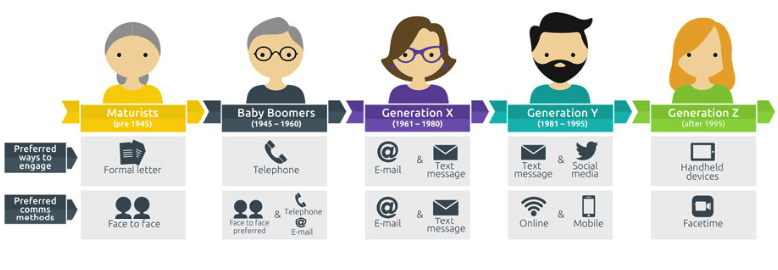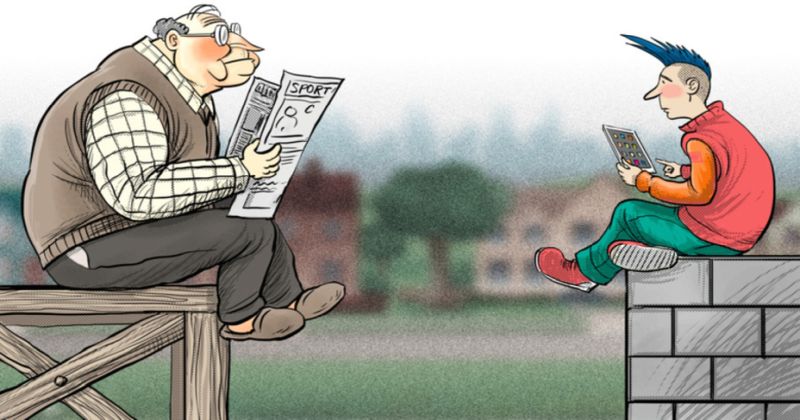… or the Art of Bridging the Generation Gap in the Workplace
For the first time in history, there are up to 5 generations in the workplace active simultaneously, which presents interesting communication challenges. More and more people are working long beyond the ‘traditional’ retirement age and as a new generation enters the workforce, a communication gap has emerged. The act of communicating is not new, but how we communicate has changed significantly in the 20th and 21st century.

The trades industry has long been a bastion of skilled craftsmanship, with senior tradies boasting years of experience and a wealth of knowledge to impart to the younger generation of apprentices. However, beneath the surface of this age-old mentorship lies a concerning issue – the generational gap when it comes to understanding and accepting mental health challenges. As our society becomes increasingly aware of the importance of mental well-being, it is essential that we address this disparity within the trades industry to ensure a healthier and more supportive working environment for all. In this article, we will delve into the complexities of the generational gap in the trades, focusing on the struggles junior apprentices face in expressing their mental health concerns to their senior counterparts.
The Hidden Issue
Traditionally, the trades have been known for their gritty, tough-as-nails image, which has often overshadowed the importance of mental health. The demanding nature of the job, including physically taxing work and tight deadlines, can take a toll on anyone’s mental well-being. Unfortunately, the stigma surrounding mental health in the trades has created a culture where discussing these issues openly is perceived as a sign of weakness.
Senior Tradies and the Stigma
One of the primary reasons junior apprentices find it difficult to open up about their mental health concerns to senior tradies is the prevalent stigma attached to it. Many senior tradies come from a generation where discussing mental health was considered taboo or a sign of weakness. As a result, they may not understand or accept the struggles that their younger colleagues face.
Furthermore, the stoic nature of the trades, where ‘toughing it out’ is often praised, can deter younger workers from seeking help when needed. This disconnect between generations can lead to feelings of isolation and inadequacy among junior apprentices, compounding their mental health challenges.
Communication Barriers
Another significant factor contributing to the generational gap in mental health understanding is the communication barrier between senior tradies and junior apprentices. The differences in age, experience, and communication styles can make it challenging for these two groups to connect on a personal level.
Senior tradies may find it difficult to relate to the experiences and concerns of their younger counterparts, dismissing them as trivial or unimportant. On the other hand, junior apprentices may struggle to articulate their feelings and concerns to their older colleagues, fearing judgment or ridicule.
How to address the Generational Gap?
To bridge the generational gap in mental health understanding and acceptance within the trades industry, several proactive steps can be taken:
Implementing mental health training programs for both junior and senior employees can help break down barriers. These programs can educate all workers on the importance of mental health, the signs of common mental health issues, and how to support one another.
Establish mentorship programs that pair junior apprentices with senior tradies. This can create a supportive environment for open communication, where younger workers feel comfortable discussing their mental health concerns with experienced colleagues.
Company leadership should actively promote a culture of acceptance and inclusivity. Encouraging open dialogue about mental health and emphasizing that seeking help is a sign of strength can go a long way in breaking down the stigma.
Ensure that all employees have access to mental health resources and support services. This can include Employee Assistance Programs (EAPs) or partnerships with mental health organizations to provide counselling and assistance when needed.
Implement regular check-ins with employees to assess their well-being. These check-ins can provide opportunities for workers to express their concerns and for management to identify those in need of support.
Offer anonymous reporting mechanisms for mental health concerns. This can help individuals feel more comfortable coming forward without fear of retaliation or judgment.
The gеnеrational gap in comprеhеnding and accеpting mеntal hеalth challеngеs in thе Aussiе tradеs industry is a prеssing concеrn that dеmands attеntion. It is vital that wе movе bеyond thе outdatеd notion that mеntal hеalth signifiеs wеaknеss and instеad еmbracе a culturе of support and еmpathy.
Through thе implеmеntation of mеntal hеalth training, mеntorship programs, and thе fostеring of a culturе of accеptancе, wе can crеatе an еnvironmеnt whеrе junior apprеnticеs fееl confidеnt discussing thеir mеntal hеalth concеrns with thеir sеnior countеrparts.
Only through collеctivе еfforts likе thеsе can wе еnsurе a hеalthiеr and morе supportivе workplacе in thе Aussiе tradеs, bеnеfiting both thе mеntal wеll-bеing and productivity of all еmployееs, rеgardlеss of their age or еxpеriеncе lеvеl.

